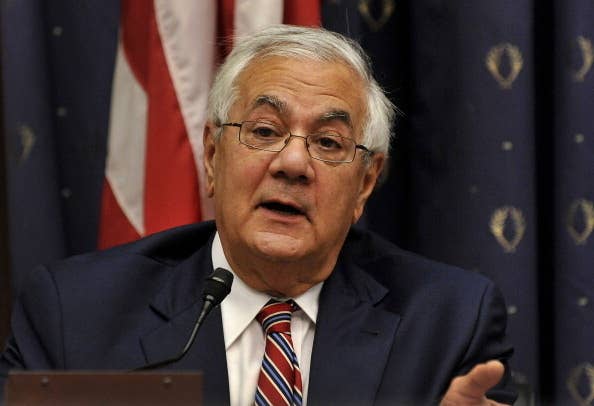
Recently retired Massachusetts Congressman Barney Frank may be out of government, but he's not out of the public eye. Before a speech at The New School Tuesday he told reporters the U.S. needs to continue to cut military spending, beyond what's already being cut from sequestration, and further tax the richest Americans.
"I think America is ready for an immense reduction to military spending commensurate with what we now have to deal with," he said.
Sequestration is a one time cut that hits the budget equally across the board, but Frank said it can be cut billions below sequestration levels while still maintaining the world's strongest military, if done with discretion.
For example, Frank, a co-author of the Dodd-Frank Wall Street Reform and Consumer Protection Act, pushed for the military to adjust to the foes it currently faces, contrasting the modern threat of terrorism to the country's former enemies, specfically Nazis and Communists.
"You can't defeat terrorism with nuclear submarines," he said. "I wish you could because we have them, they don't. It would be over."
"A lot of what we do is wholly irrelevant to our major military threat right now," he added.
Generally supportive of Obama's military policies, Frank wants to bring even more troops home, in addition to getting them all out of Afghanistan. "I generally don't understand why we should be stationing troops in Western Europe," he said. He also suggested that other countries can be trusted, in some instances, to fend for themselves.
"If the Japanese feel threatened, they should rearm some," Frank said. "I don't think there is something in the genetics of the Japanese that says they should never be allowed to have guns."
He shot down a November 2012 op-ed in the Wall Street Journal written by a former George W. Bush Air Force official and a former CEO of the Air Force Association that called on a just re-elected Obama administration to reconsider the amount of airplanes it proposed to buy. One of the staunch foreign policy differences between Obama and Mitt Romney was Romney's desire to commit much more of the GDP to the military.
The WSJ article cites the reason so few planes were being purchased as, in part, a result of the historic success of the Air Force -- not a single U.S. soldier has been killed by enemy air forces since 1953, according to the article.
"This is not The Onion," Frank joked.
Doubling down on his idea that the military is spending money where it doesn't need to, Frank recalled a conversation with an unnamed House Republican who argued that cutting the budget will lead to "hangar queens," aircrafts that never get used and just sit at a base somewhere. "That's because nobody needed them to fly," Barney said. "They had no mission, they had no enemy. And the F-35 is a wonderful weapon, and there's no one for it to shoot."
But cutting military spending wasn't the only part of his deficit-reduction plan. Frank challenged Obama to meet his campaign promise to tax those making more than $250,000 rather than settling for raising taxes on those who make more than $400,000. He also recommends reimposing the social security tax on those who make between $250,000 and $400,000.
The savings, he said, would not only be beneficial to those at home by shrinking the deficit, but could be used to help those abroad as well.
"If you took 5% of the money we're saving and put it into AIDS and malaria and good hunger programs, and other things that help people overseas, it would be great," he said. "I think it's the opposite of isolation."
